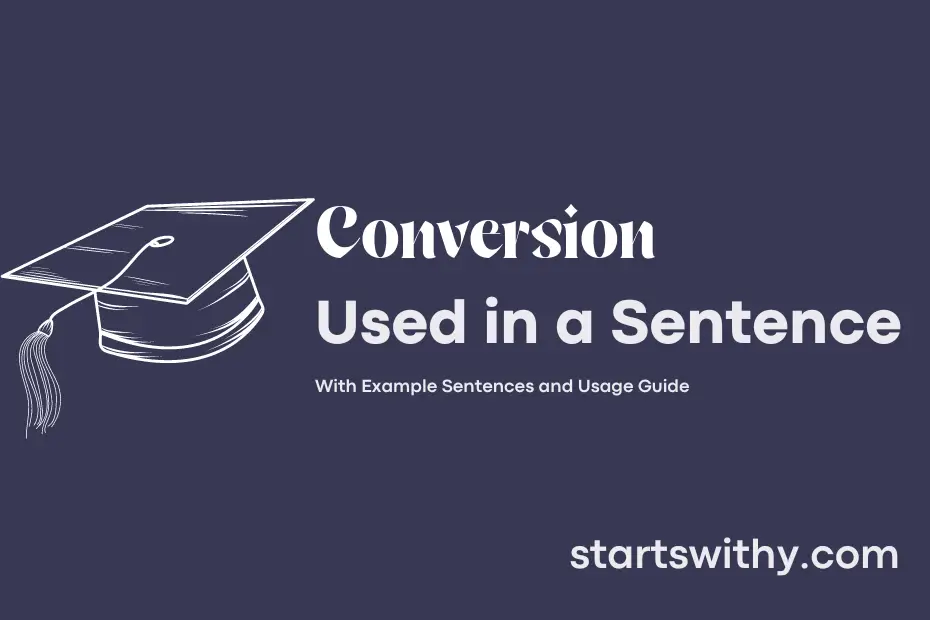Conversion refers to the act or process of changing or transforming something into a different form, state, or purpose. In various contexts, conversion entails converting one thing into another, whether it be currency, units of measurement, or beliefs.
This term is commonly used in marketing to describe the transformation of a casual visitor into a paying customer, subscriber, or lead. Through the strategic implementation of marketing tactics and sales techniques, businesses aim to improve their conversion rates and ultimately drive growth and profitability.
7 Examples Of Conversion Used In a Sentence For Kids
- I learned how to do conversion of numbers in math class today.
- Let’s practice conversion of kilograms into grams!
- My teacher showed me a fun game to help with conversion of units.
- Can you show me how to do conversion of hours into minutes?
- I can do conversion of rupees into paise all by myself now!
- Conversion of meters into centimeters is easy once you know how.
- Remember to always double-check your conversion answers, just to be sure!
14 Sentences with Conversion Examples
- Conversion of Celsius to Fahrenheit can be easily done using a simple formula.
- It’s important to understand the conversion of currency rates before traveling abroad.
- In the field of computer science, knowledge of binary to decimal conversion is essential.
- Understanding the conversion of marks to grades is crucial for interpreting academic performance.
- Efficient conversion of units is necessary for accurate scientific calculations.
- Knowing the conversion of GPA to percentage is important for college admissions.
- In the business world, conversion of leads to sales is a key part of the sales process.
- The conversion of renewable energy sources like solar power is vital for sustainable development.
- Conversion of raw data into useful information is a key skill in data analysis.
- It is essential to understand the conversion of time zones when planning international meetings.
- Conversion of text to speech is a feature that can assist students with learning disabilities.
- Being able to calculate the conversion of metric measurements is useful in scientific experiments.
- When studying abroad, conversion of study credits may be necessary to transfer to your home university.
- The conversion of traditional classrooms to online learning platforms has become more prevalent in recent years.
How To Use Conversion in Sentences?
Conversion is the act of changing or transforming something into a different form. When using Conversion in a sentence, it is important to consider the context in which the word is being used.
To use Conversion in a sentence, start by identifying what is being changed or transformed. For example, “The conversion of the old warehouse into a modern office space was a huge success.” In this sentence, the word Conversion refers to the process of turning the warehouse into an office space.
When constructing a sentence using Conversion, make sure to clearly indicate what is being converted and what it is being converted into. For instance, “She made a quick conversion from Euros to Dollars before making the purchase.” Here, the word Conversion is used to describe the changing of currency from Euros to Dollars.
It is also important to pay attention to the verb that is used alongside Conversion in the sentence. Common verbs that are used with Conversion include “making,” “performing,” “completing,” and “calculating.”
In summary, using Conversion in a sentence involves clearly establishing what is being transformed and what it is being transformed into, choosing an appropriate verb, and ensuring the sentence makes sense in context.
Conclusion
In conclusion, sentences with conversion serve the purpose of persuading or convincing the reader to take a specific action or change their perspective. Whether it is convincing someone to buy a product, sign up for a service, or adopt a new belief, these sentences are carefully crafted to influence the target audience’s decision-making process. By using powerful language, emotional appeals, and calls to action, writers can create impactful sentences that drive conversion rates.
Ultimately, mastering the art of crafting sentences with conversion is key for marketers, writers, and communicators looking to deliver their message effectively and achieve desired outcomes. By understanding the psychology behind persuasive language and implementing strategic techniques, one can significantly increase the likelihood of achieving the intended results and achieving success in communicating their ideas.



